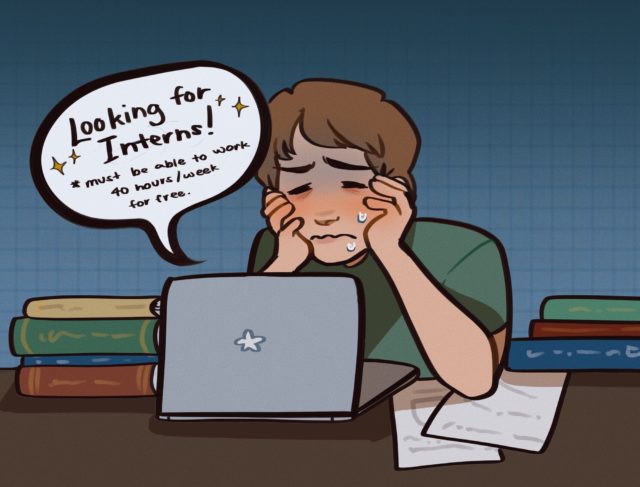All work and no reward.
As nonprofit organizations and businesses alike continue to offer unpaid internships, many students must decide between boosting their resumes and paying their bills.
Some may say unpaid internships are a good learning experience, but they’re just another way to widen the divide between lower- and higher-income students, particularly during the economic upheaval caused by the COVID-19 pandemic.
As Bruins get ready to start what will undoubtedly be a challenging year, UCLA needs to do its part to alleviate the inequity of unpaid internships.
While UCLA already offers academic credit for student internships, the school must do more. Students shouldn’t have to enroll in a class, which requires assignments and biweekly meetings, to compensate for the lack of pay. It simply isn’t reasonable for students to add more to their plates when they’re already working long hours.
Additionally, UCLA should allocate more funding to low-income students in the internship market via increased scholarship opportunities or offer more paid internships from the school itself.
Unpaid internships are a euphemism for free labor. More than 40% of interns surveyed by the National Association of Colleges and Employers are unpaid, and they often perform work that companies would usually hire paid employees for.
“If you have interns, you should pay them, just because it’s a big commitment and college students have a lot to balance,” said Brooke Sagun, a fourth-year communication student.
Sagun added that career websites such as Handshake should prioritize paid internships. She went on to say that UCLA should educate students about the importance of paid internships. For example, the UCLA Career Center can host more workshops on the differences between paid and unpaid internships and connect students to paid internships before unpaid ones.
However, unpaid internships are legal if they meet the vague guidelines outlined in the Fair Labor Act, which require interns to meet certain criteria under the primary beneficiary test. But without clear distinctions, defining those requirements has been largely left to interpretation.
And when things are left for interpretation, companies can exploit their interns. In 2013, a district court case against Searchlight Pictures ruled that their unpaid internship violated federal worker laws as the unpaid interns were not the primary beneficiaries of the internship and were acting as de facto employees.
It’s clear that unpaid internships are a way for companies to take advantage of hardworking students trying to get ahead in the job market.
Fortunately, UCLA allows students to earn academic credit for working in unpaid positions, whether they are on campus or off campus. For instance, the Student Research Program offers SRP-99 credits for students who conduct research with faculty.
While this is a great incentive for students to begin undergraduate research, one or two units of academic credit are not nearly enough to repay the countless hours students spend in labs or archives.
UCLA’s 195CE internship course offers four units of academic credit for internships with off-campus nonprofit organizations, governmental agencies and private corporations.
This means students receive credit for some of the work they do – but academic credit can never amount to pay.
“I honestly don’t think credits are enough,” said Jackie Lim, a third-year civil and environmental engineering student. “It’s time and a lot of effort that you never get back.”
Lim also noted that internships provide hands-on experience and allow students to apply what’s learned in the classroom.
It’s one thing if unpaid internships help students prepare for their careers, but that’s not always the case.
A 2016 study conducted by NACE found a statistically significant correlation between professional skills and paid internships but not with unpaid ones.
Not only are students insufficiently repaid for their work, but they are also disadvantaged in gaining the skills they need to get paid positions in the future.
In fact, according to the same study, students who engage in unpaid internships are more likely to be paid less when it comes to full-time careers.
And for some students from disadvantaged backgrounds, performing unpaid labor just isn’t an option.
On average, it costs a student $680 to accept an unpaid summer internship in terms of forgone pay. However, that amount could be much higher depending on how long students participate in internships. A survey conducted by The Hill found that 69% of surveyed students could not afford to take an unpaid internship, potentially putting their resumes further behind than those of their peers when the time comes for full-time employment.
“In principle, every internship should be compensated financially,” said the UCLA Center for Community Engagement in an emailed statement. “Students without the economic means to take an unpaid internship are disadvantaged by the current practice of unpaid internships.”
UCLA has a responsibility to ensure that its students are sufficiently compensated for the work they do. It should look into increasing the number of available scholarships to student interns and advertising these opportunities across campus to ensure Bruins are aware of the resources at their disposal. The practice of offering academic credit just doesn’t cut it.
This isn’t to say that universities are the sole entities responsible for keeping companies in check – employers must be able and willing to pay their interns. However, UCLA can and must go beyond what it’s doing.
As the COVID-19 pandemic continues to wreak economic havoc on students and companies alike, unpaid internships must come to an end – and so too must the university’s complacency.

